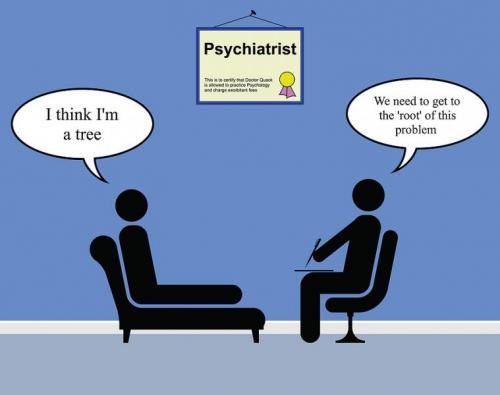
Why Gail Porter is so right about hospitals
I felt deeply sad when I read, in yesterday's Mail on Sunday, Gail Porter's interview about her experience of sectioning. I knew she'd been in hospital -- Mental Healthy covered the story at the time - but it wasn't until I read this interview that I realised just how important her story is, and how typical of the NHS.
Gail told the newspaper: "It seemed to me that the nurses didn’t really know what to do with us so it was easier to give us lots of drugs so we were calm and quiet. In three weeks I saw three doctors for ten minutes each. Each time all I was asked was, “How are you feeling?” I told them I felt depressed, they wrote it down and a week later another one came back.
‘There was no treatment programme and nothing to do. It meant patients just focused on their problems instead of getting better. My ex-husband came to visit me and said recently, “You got madder every day you were in there. You were dosed up to your eyes with nothing to do.”
My experience of hospitalisation mirrors Gail's
That mirrors my experience of being hopitalised on a section for four weeks and a return to hospital, feeling suicidal, 6 months later for three weeks. I only saw the psychiatrist at ward rounds for 10 minutes each week, at which point all that was discussed was whether I was fit for release and no attempt was made to give me any insight into my acute psychosis or to talk me round from my suicidal ideation. Nor did any of the ward staff make any attempt to help me, although there were two kind staff who would question me at length about suicidal thoughts before allowing me off the ward.

I was disturbed to read the Daily Mail's description of Gail's fellow patients as "people who thought they were Jesus and paranoid schizophrenics". Tabloids really have a problem with people with schizophrenia. I know dozens of others with it -- we're all gentle, caring, normal, ordinary, safe, and stable people who occasionally have bad relapses and need treatment. Gail's experience on the wards of a woman flushing the toilet at 3am and talking to the cistern in the belief it was her communication with God is highly unusual even for an acute psychiatric ward. I have been, as either an inpatient, or visitor, on about half a dozen psychiatric wards and I have never witnessed anything bizarre. Nor have I every felt threatened or vulnerable to harm in any way. Except from myself ...
It seems natural for Gail to tell the Lorraine programme this morning that she would like to be a counsellor. Most people who've recovered, or are in recovery, from mental illness, want to give something back. I do. It's why I work as a mental health journalist and blogger, and volunteer at head office of a national charity for people with mental heatlh difficulties. I could never be a counsellor - I am a very good listener but I have far too many boundary issues: I am deeply affected by what people tell me and it makes me often very unwell to listen to their problems, especially if they are particularly traumatic or if I am very close to them. Mental health professionals receive "supervision" and, though some have obvious compassion fatigue, all of those working with me clearly are troubled by the difficulties I've faced during my life and are moved by them. I know I've caused some to seek supervision, as some have told me so.
The current state of NHS psychiatric wards:
So what would I say from my experience about the current state of inpatient wards in NHS hospitals? Well:
- The rise in community-based and home treatments means only the most ill patients are in hospital now which can be distressing for other inpatients and visitors
- There are fewer staff on the wards than ever before and most don't have time to spend with patients - they have a lot of computerised records and paperwork to do which is one reason
- Psychiatrists only see their patients during ward rounds - 10 minutes a week
- Wards are non-therapeutic environments: there's little access to activities or therapies
- Medication is dispensed liberally and often without consent - I was on *five* drugs at one point
- Lack of access to open spaces, especially for those sectioned, is unhealthy and deprives of exercise
- Meals are usually unhealthy - I'm also veggie and was given no veggie food (just chips/peas and puddings) for 3 weeks. As a result of two hospitalisations, I put on 3 stone.
- It's hard to get onto a psychiatric ward - the gatekeepers are the crisis team and they're paid not to admit people
- More and more facilities are closing and not being replaced - "unfit for purpose" - and new builds are being axed because of Tory cutbacks
I wish Gail well in her recovery in Thailand and for her future career as a counsellor. As my colleague Liz reported today, she has a lot of recovering to do before she is strong enough to take this on, and it's a huge undertaking. I know I couldn't do it, and I have such enormous respect for those who can. I have been counselled a few times in the past and these short courses have been with amazingly kind, reflective listeners and, when on the NHS, with a detailed knowledge of when to refer upwards to other mental health professionals to prevent relapse or suicide.
Until next time, take care.





Comments
Post new comment